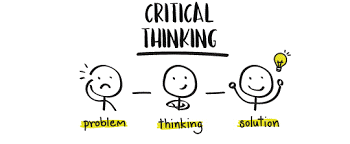INTRODUCTION:
Every individual has a tendency to reason, think and solve the problems. All these are cognitive processes and their development is imperative. These skills are required by an individual to explore the world around and face the challenges. In this particular blog, we would discuss about the cognitive processes such as Logical Reasoning and Concept Formation. Let us begin with Logical Reasoning.

LOGICAL REASONING:
Reasoning is basically a phenomenon of drawing conclusions through logical thinking. Every human being possesses the ability to reason. To Reason means to see the relation between various aspects of a process and to develop an understanding as to why and how the process occurs. Reasoning, as a process, is not as simple as it seems. Reasoning will be termed as ‘Logical’ only if it is based on certain norms and proofs.
Logical Reasoning is of two types i.e.
- Deductive Reasoning 2) Inductive Reasoning.
Deductive Reasoning:
Deductive reasoning proceeds from ‘General’ to ‘Specific’. It is the ability to arrive at some logical conclusions on the basis of evidence. The following flowchart can be helpful to understand about the nature of deductive reasoning.
Analysis of Situation
Gathering and relating the evidence with posed problem
Arriving at Conclusion
It must be kept in mind that the conclusion must be logical which means that it could be proved to be true at any time. Deductive reasoning is a complex process owing to the biasedness of human mind. Each individual has his own way to look at a problem and that’s where biasedness creeps in.
Let’s look at a Syllogism to understand about the validity of conclusion.
All bananas are fruits.
All fruits are sweet.
So, all bananas are sweet.
The conclusion is valid and therefore this type of reasoning is termed as deductive reasoning. Now let’s see another example.
All Santros are Cars.
All Cars are Zens.
So, All Santros are Zens.
This conclusion is invalid and it leads to logical error. Thus, deductive reasoning can be hampered at any step if it leads to invalid conclusion.
Our scheme of thinking is reflected through the errors that we commit during deductive reasoning.
Inductive Reasoning:
Inductive reasoning is the exact reverse process of deductive reasoning because here we proceed from ‘Specific’ to ‘General’. It involves the comprehension of specific observations and thereafter leading to generalizations. Inductive reasoning is comparable to ‘Hypothesis testing’ as it involves a similar process of devising tentative solutions to the problem and then testing these one by one before selecting one particular solution as the best one, which is then generalized and implemented.
Let’s consider a simple situation to understand Inductive reasoning.
Problem: The refrigerator in your house stops working.
Now, in order to sought out this problem we devise tentative solutions which may be as follows:
- Check electricity supply.
- Check connection.
- Check wiring.
If none of the tentative solutions work then we would generalize that there might be some internal problem in the refrigerator and we call the mechanic.
This is how inductive reasoning works.
Techniques for developing Logical Reasoning in Students:
- Allow them to handle real life situations
Logic is a skill. It comes through practice. Children would definitely be better at applying logic if they practice it on everything. Parents or teachers can introduce the children with small, real-life activities in which they have to think and apply their own logic.
Example: Give them a task to repair something at home within a certain budget. Let them think-
How to repair that stuff?
How to manage the task in the allocated budget?
- Games
Games can also help to improve logical reasoning.
- Chess (helps to improve logic and strategy)
- Sudoku (logic based number game)
- Brain teasers such as puzzles and riddles
- Solving Crosswords
- Number and Letter sequencing
- Solving certain set of questions
- Aptitude tests certainly help to improve logical reasoning
- Solving mathematical word problems
- Solving problems related to premise and conclusions
CRITICAL THINKING:
Critical thinking allows us to evaluate, analyze, compare and critique the information. Critical thinkers are usually broad-minded and they re-frame their views based on new knowledge.
According to Cameron, “Effective thinking is based on applying new learning to situations in order to solve problems, reach decisions or make evaluations”.
It includes the ability to use knowledge in order to identify and describe a problem.

Critical thinking skills are among the prominent goals of education. The various strategies that can be used to make students think critically are:
- Classroom Assessment Techniques
This technique allows the students to assess the lessons. Putting questions like ‘What’s the most important thing you learnt from today’s lesson’ will definitely get them into thinking critically.
- Case Study
In this technique a discussion is to be held or a case study has to be presented in the classroom. Just remember that no conclusion is to be presented. Let the students think about the discussion and draw their own conclusions based upon their thinking.
- Conference Style Learning
The teacher should avoid “teaching” in the class and instead play the role of a facilitator in a conference, where you guide the students while they engage in self-learning. The teacher must not acquire a passive role but should remain in control of the process while allowing students to do the thinking.
- Writing Assignments
Giving assignments to the students encourages them to think through an issue. Encourage them to look on-to both sides of the issue before arriving at any conclusion. This would help them to analyze the pros and cons of the problem in-hand.
- Ambiguity
Being a little ambiguous in the class forces the students to think for their queries. There is a slight difference between being ambiguous and simply confusing your students. Don’t confuse them, instead try to bring out the best in them by probing them to find the solutions for their problems.
So, this was all about Logical Reasoning and Critical Thinking.
